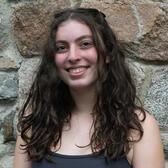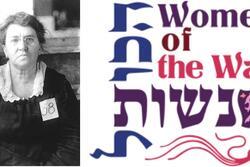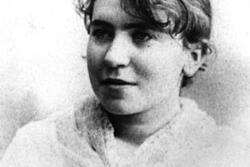Emma Goldman and A Jewish Approach to Liberation
As a Jewish woman involved in environmental and feminist activism today, I find so much to learn from Emma Goldman, perhaps the only person anarchists willingly refer to as their queen. She drew upon her Judaism as a source of radical moral guidance and held fiercely to her Jewishness without limiting herself to it, challenging each of us to bring our politics and identities into symbiosis.
It may seem counterintuitive to honor Emma as a quintessential Jewish activist. Born into an Orthodox Jewish family in Lithuania in 1869, Emma always chafed against her conservative Jewish community. Both her father and religious teacher refused to support her education, with her father even saying, “Girls do not have to learn much! All a Jewish daughter needs to know is how to prepare gefilte fish, cut noodles fine, and give the man plenty of children.” After moving to Rochester, New York as a teenager, she was ostracized from the Jewish community for scandalously divorcing the same man twice. Even after she moved to New York City for a lifelong career as a public speaker, writer, and organizer, she continued to make a point of refuting Jewish tradition (for example, by throwing parties on Yom Kippur). Emma did not even focus on specifically Jewish issues, instead campaigning for economic democracy, birth control, and anti-fascism.
Yet it is impossible to separate Emma’s Jewishness from her anarchism. Being Jewish formed each of Emma’s experiences with oppression: living in poverty due to antisemitism in Lithuania, toiling in the heavily Jewish immigrant garment industry, and being denied autonomy by the Jewish men in her life. Thus as a working-class female Jewish immigrant, Emma’s personal experiences showed her the complexity of oppression. They convinced her that it was not enough to oppose just capitalism, patriarchy, the state, or antisemitism, but social hierarchies as a whole. In other words, Emma rejected focusing exclusively on one aspect of her identity, such as Judaism, precisely because of the ways Jewishness shaped her life.
Emma’s approach is perhaps best summed by an anecdote from her autobiography. She describes another Jewish socialist, Chaim Zhitlovsky, “urging upon me that as a Jewish daughter I should devote myself to the cause of the Jews.” But, Emma retorts, “at the age of eight I used to dream of becoming a Judith and visioned myself in the act cutting off Holofernes’ head to avenge the wrongs of my people. But since I had become aware that social injustice is not confined to my own race, I had decided that there were too many heads for one Judith to cut off.” Emma did not ignore the struggles of the Jewish people but neither did she limit herself to them, and her experiences with Jewish oppression were just what taught her to take a holistic view of liberation.
For me, Emma’s choices illustrate a path to reconciling Judaism and radical politics. Like Emma, my activism doesn’t center on the Jewish community. Instead, I organize for climate justice, mutual aid, and consent education. But I still feel that my Judaism is inherently tied up in my activism. Jewish experiences both positive, like Jewish summer camp or my bat mitzvah, and negative, like experiencing antisemitism, have spurred my activism. And I believe that Judaism calls each of us to tikkun olam, teshuvah, tzedek, and myriad other transformative values.
Yet being a self-consciously Jewish activist is not always easy. Emma, like many others throughout history, faced antisemitism from her fellow leftists. While there is no doubt that right-wing antisemitism is more threatening to Jewish safety (for example, every single recorded antisemitic incident attributed to an extremist group in 2021 “emerged from adherents of right-wing or white supremacist ideologies"), antisemitism on the left still poses a notably persistent problem that alienates and harms many Jews. I have struggled to deal with this myself: how do I continue to work with people I am otherwise politically aligned with, when they erase, stereotype, or denigrate the Jewish community? People I care for and respect have told me that Zionism is illegitimate simply because Jews are “naturally nomadic,” that American Jews shouldn’t get the day off from school or work for Jewish holidays because Israel doesn’t respect Muslim holidays, that the January 6th rioters had nothing to do with antisemitism. It is, frankly, a hurtful and difficult position to be in. Yet Emma offers an illuminating example of navigating this tricky territory.
For instance, when her mentor and colleague Johann Most decried Emma’s partner Alexander Berkman as an “arrogant Russian Jew,” Emma writes, “I, too, was a Russian Jew. Was he, Most, the anarchist, an antisemite?... What kind of anarchism was that?”
In Emma’s response to this incident, we see how she always returns to her anarchist values, calling out her colleagues when they contradict these beliefs. Personally, I hold fast to this mindset. When encountering antisemitism—or prejudice of any kind—in leftist spaces, we should absolutely call it out, but neither should we give up on activism altogether. Indeed, I believe Emma’s Jewishness allowed her to hold fast to her ideals in a way that many other anarchists of the time did not. The antisemitism she experienced constantly reminded her of the left’s flaws, so she never had the chance to idolize it. Thus, Emma was never afraid to reproach the left; for example, she was widely ostracized from activist circles for her outspoken criticism of the USSR.
Emma shows how Jewish activists can embrace our Jewishness no matter what specific issues we might focus our activism on, and how to hold fast to that Jewishness in the face of a sometimes-inhospitable movement. I find myself re-reading Emma’s words again and again: there may be “too many heads for one Judith to cut off,” but that’s exactly why we need a movement of Judiths, each of us finding our own Jewish path to liberation.
This piece was written as part of JWA’s Rising Voices Fellowship.







